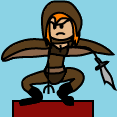While I like the concept, I'm not so certain it's something you need to write into the system.
I mean, most people simply say "hey, let's lay off these characters and roll up some new low-level ones" when faced with that situation. Many DMs have run "organic" campaigns in which one party becomes part of the backstory of the next without having to tack on additional mechanics to make it work.
Could there be mechanics that enhance this sort of behavior? Possibly, but I can't think of any which would be superior to not having written rules to worry over.
* * *
As far as high-level play, I think WotC would have been best served by either going with "retire and start-over" or "3e Casterpocalypse" and not trying to have both at once.
People who enjoy 3e Epic games enjoy having casters that can do ridiculous things; it is a fundamentally different style of play from earlier where you operate under constraints. It makes no sense to include both types of game-play under one set of rules -- Core 5e should be "1-10 then retire" and then later release a "Epic 5e" module where people can design Fantasy Superheroes from Day 1 while also including a detailed system for "epic stories" like managing kingdoms, fighting Gods and whatnot. Anything less is simply not going to feel "epic" enough for these types of Players -- as 4e demonstrated.
View Single Post
Thread: D&D 5th Edition: Thread #7
-
2012-11-05, 07:26 PM (ISO 8601)Titan in the Playground


- Join Date
- Oct 2007
- Location
- Chicago, IL
- Gender

 Re: D&D 5th Edition: Thread #7
Lead Designer for Oracle Hunter GamesToday a Blog, Tomorrow a Business!
Re: D&D 5th Edition: Thread #7
Lead Designer for Oracle Hunter GamesToday a Blog, Tomorrow a Business!
~ Awesome Avatar by the phantastic Phase ~Spoiler
Elflad


